20 High Protein Vegetarian Recipes
This post may contain affiliate links. As an Amazon Associate, I earn from qualifying purchases. Please read my disclosure.These 20 high protein vegetarian recipes will keep you full and satisfied! Plus they’re packed with nutrients, vitamins and minerals. Whether you’re looking for a high protein breakfast, lunch, or dinner, you’re sure to find a mouth-watering meal you’ll want to make ASAP!
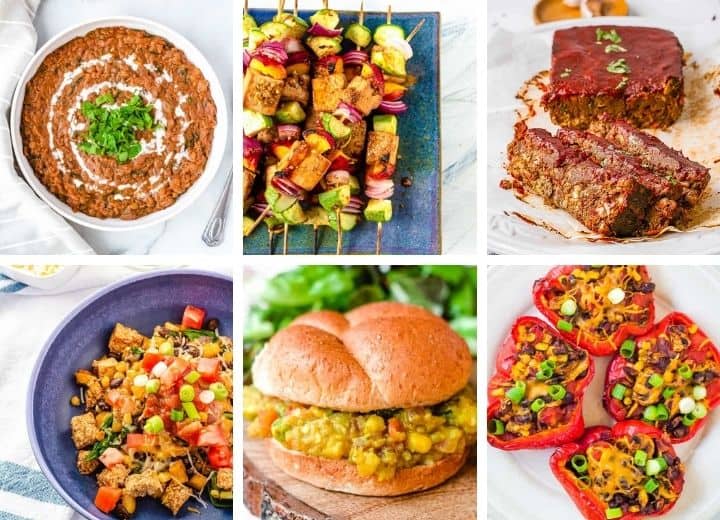
One of the most frequent questions I get when I tell people I’m vegetarian is: “But then where do you get your protein?”
It’s common knowledge that meat is a great source of protein, but you don’t actually need to eat meat to get enough protein!
Somehow, being vegetarian has become synonymous with just eating leaves (which do have protein btw) — but it’s a myth that vegetarians don’t get enough protein.
Additionally, vegetarian sources of protein can be healthier for you in that they’re lower in bad fats and cholesterol.
When you’re looking for a high protein meal, you want it to fill you up, give you energy, and help build muscle. These recipes are simple, super filling, and use pantry ingredients!
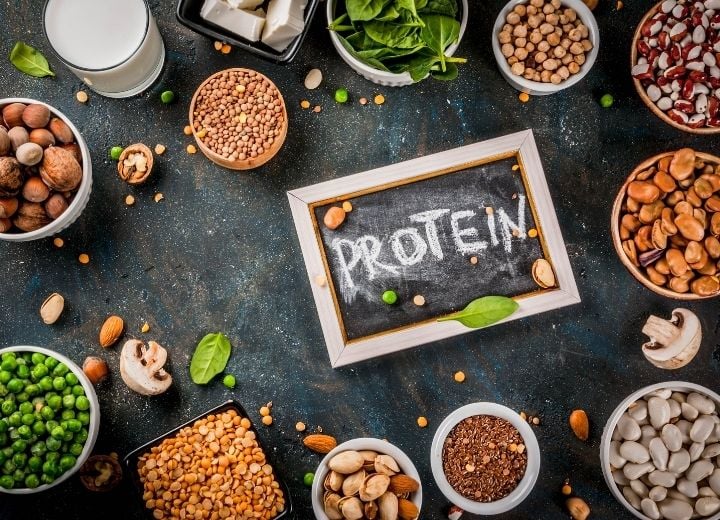
Why Is Protein Important To Include In Your Diet?
- It helps promote cell growth and repair. Hair and nails are mostly made of protein.
- You need it to make enzymes, hormones and other body chemicals.
- It is an important building block of bones, muscles, cartilage, skin, and blood.
- It takes longer to digest than carbohydrates, helping you feel fuller longer and on fewer calories (a plus for anyone trying to lose weight).
You’d be surprised how much protein vegan and veggie friendly sources have: 5g of protein for 1 cup of spinach anyone?
There are 50 sources of plant-based protein, and that’s not even counting vegetarian-friendly protein sources like dairy and eggs!
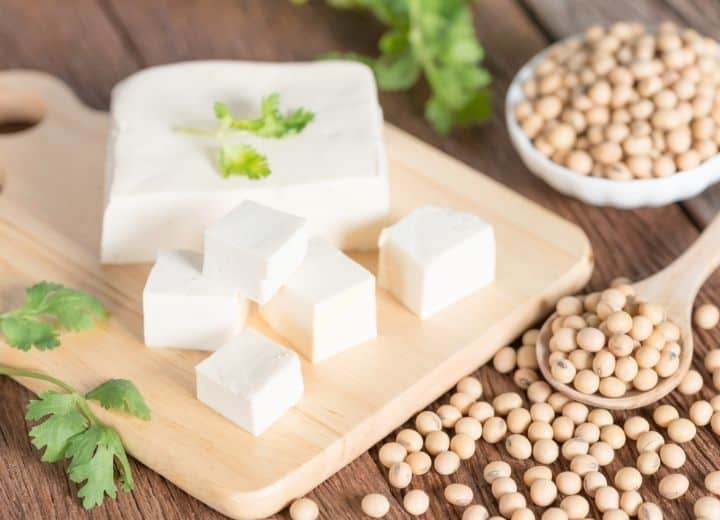
What Are The Highest Plant-Based Protein Sources?
Tofu, tempeh, and edamame are all sources of soy protein. Firm tofu contains 10g of protein per 1/2 cup. Edamame or soy beans have 8.5 g of protein per 1/2 cup. Tempeh has the highest amount of protein per 1/2 cup at 15 grams.
Lentils, chickpeas, and beans are legumes. In addition, they are high in fiber, iron, and potassium. Cooked lentils have 8.8 grams of protein per 1/2 cup. Chickpeas contain 7.25 grams of protein per 1/2 cup. Legume based pasta can have up to 15-20 grams of protein per serving!
Peanuts, almonds, and nuts are high in protein and healthy fats. I recommend a 1/4 cup serving of nuts (max) a day because they are high in calories. A 1/4 cup of peanuts contain 10 grams of protein, a 1/4 cup of almonds contain 8 grams of protein.
Quinoa is a high protein grain that is a complete protein. When cooked, quinoa has 8 grams of protein per cup. Quinoa is also a good source of magnesium, iron, fiber, and manganese.
Chia, hemp, and flax seeds are not only good sources of protein, but also fiber, and omega-3 fatty acids. Seeds are also a complete source of protein like quinoa. Chia seeds have 2 grams of protein per tablespoon. Hemp seeds have 5 grams of protein per tablespoon. Flax seeds have 2 grams of protein per tablespoon.
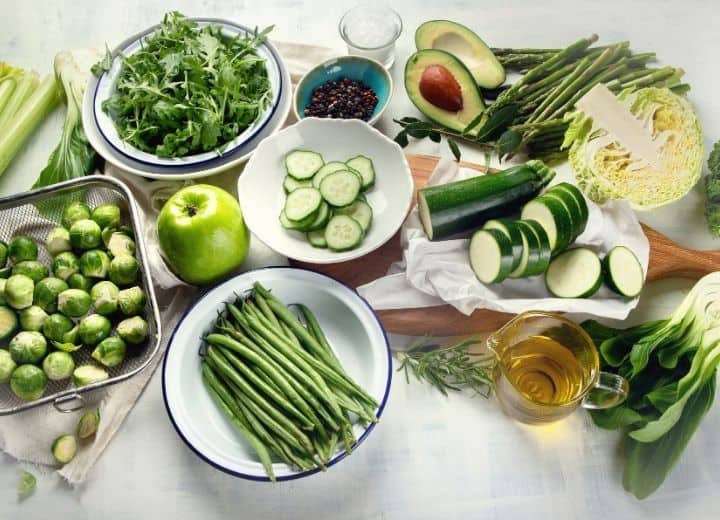
What Vegetables Are High In Protein?
Vegetables are also good sources of protein. Some vegetables have higher amount of proteins than other. These are the veggies with the highest protein content:
Green Peas are one of the vegetables with the highest amount of protein. One cup of peas has 9 grams of protein. Throw them on your salads, in your soups, on your pasta. They bring a bright fresh flavor to your recipes and will fill you up too!
Brussels Sprouts have about 6 grams of protein per cup. Enjoy them boiled, or roasted!
Potatoes have protein too! One medium baked potato has 4.5 grams of protein.
Asparagus has 4 grams of protein per cup. Steam or grill your spears for a delicious side dish!
Broccoli is a nutrient rich vegetable that contains fiber, vitamins K and C, and many more vitamins and minerals. It’s also high in protein, with 4 grams of protein per stalk. Add broccoli to soups, as a side dish, in casseroles, and more!
Avocado are an excellent source of healthy fats, but they also are a good source of protein. One avocado has 4 grams of protein. Enjoy your avocado diced on salads, as a dip with guacamole, or in your morning smoothie!
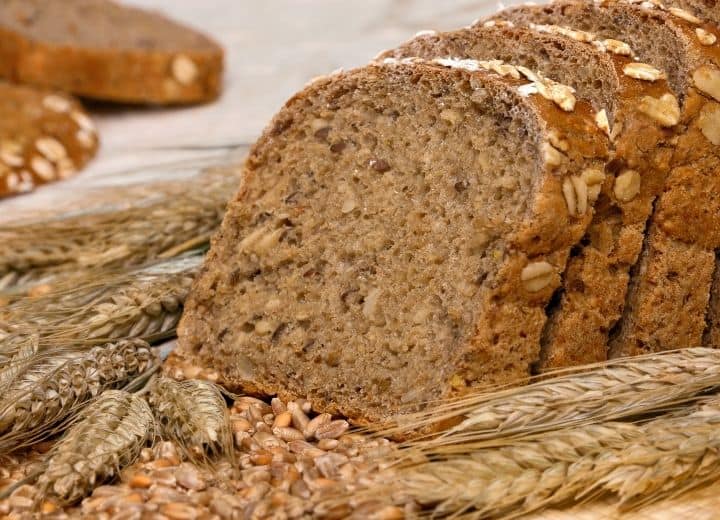
What Grains Are High In Protein?
Whole wheat pasta, sprouted wheat bread, and whole grain bread have 8-10 grams of protein per serving. Pair with high protein vegetables and legumes for a protein packed meal.
Wild rice has 6 grams of protein in one cup, and brown rice has 5 grams of protein per cup. Pair with a veggie stir-fry and tofu.
Couscous has 6 grams of protein per cup. Top with this Italian ratatouille.
Oats have 6 grams of protein per cup. Enjoy them in your morning oatmeal, make pancakes from oat flour, or put in your smoothie.
High Protein Vegetarian Breakfast Recipes
If you’re looking for a high protein vegetarian breakfast to get your day started, you won’t want to miss these! Oats and smoothies are two options that will fill you up and provide you with much needed protein in the morning. Especially when you add some high protein ingredients like nut butter, seeds, or protein powder.
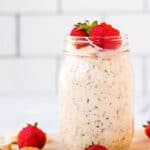
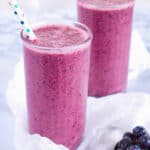

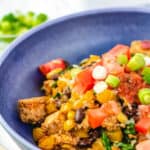

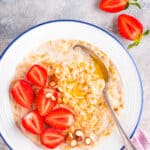
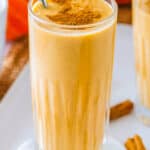
High Protein Vegetarian Lunch and Dinner Recipes
Looking to add more plant protein to your dinners and lunches? Try adding some of the high protein ingredients mentioned above such as beans, lentils, tofu, and tempeh.
Then mix in some of your favorite high protein veggies like broccoli, asparagus, brussels sprouts, or green peas.
You can add more protein to your meals by using whole wheat, lentil, or chickpea pasta. Serve your vegetables with quinoa, brown rice, wild rice, or couscous.
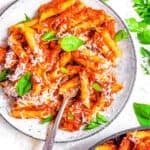
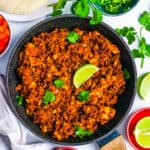
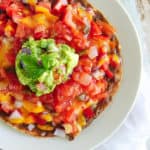
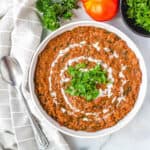
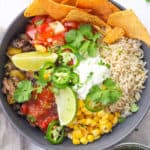
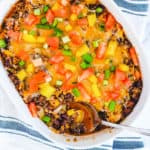
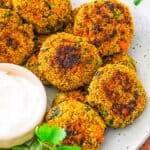
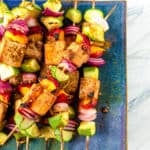
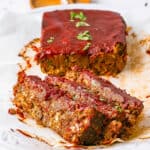
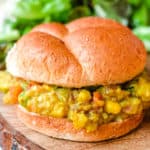
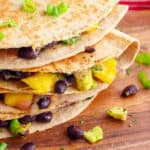
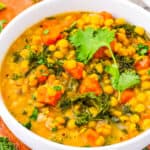
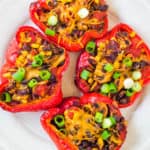
I hope you have found some high protein vegetarian recipes you’d like to try!
Check Out These Other Healthy Vegetarian Resources And Recipes!
- High Protein Vegan Breakfast Recipes
- High Protein Vegan Meal Prep Ideas
- Rice Cooker Recipes
- Last Minute Dinner Ideas
- Crispy Air Fryer Tofu with Vegan Ranch Dressing
- Vegetarian Grocery List: A Complete Guide
- Healthy Pizza Topping Ideas
FOLLOW ME on FACEBOOK, TWITTER, INSTAGRAM and PINTEREST to see more delicious, healthy, family friendly food!



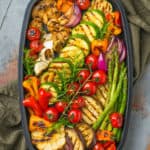
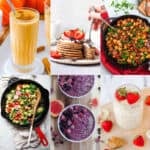





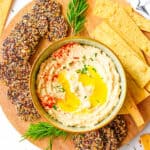

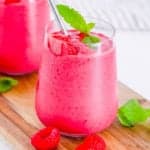
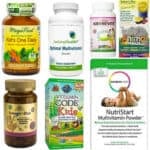
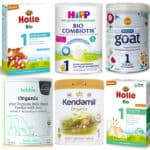


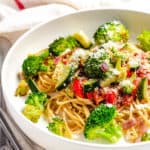
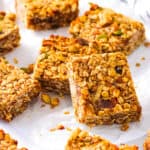


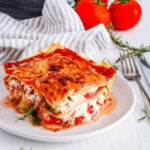

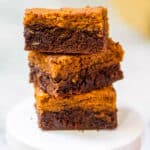
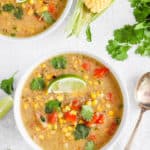

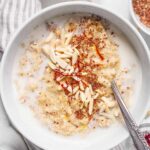



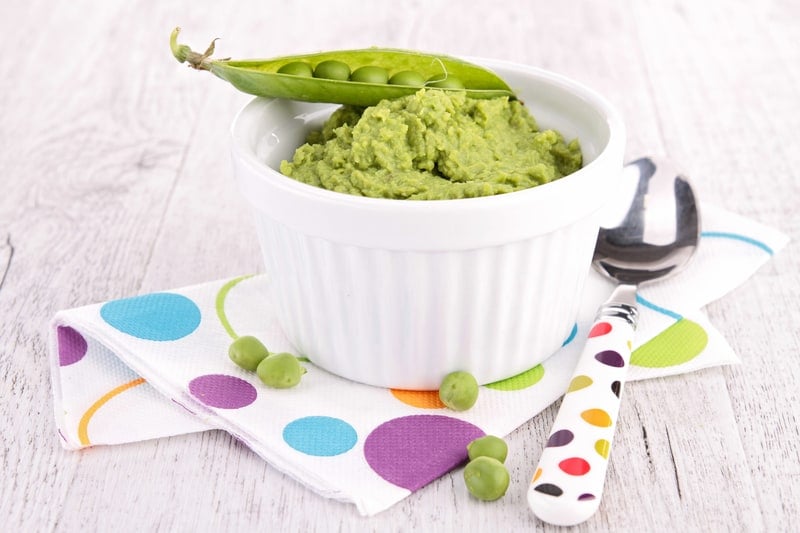
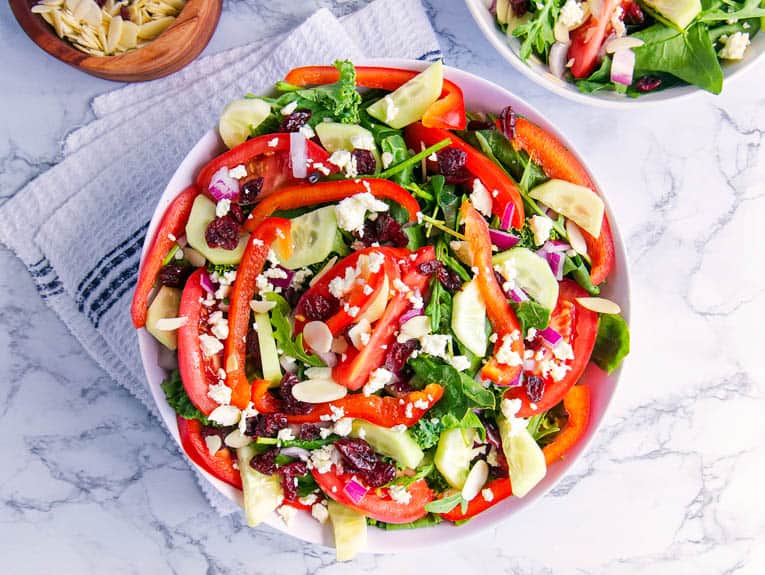


Found these recipes very helpful! I’m a very picky eater and found more than a few of these suited for me. They were very tasty and helped me increase my protein intake. Turned veggie a few months ago and have eaten very little protein before finding this site. Awesome food, thank you!
Oh awesome!! So happy to hear that Ella! 🙂
I was looking for alternate vegetarian diet options to replace my Non-vegetarian diet which i want to get rid off. Thanks a lot for this share.
Great! Glad you found it helpful!
I am a new vegetarian. I have not eaten any kind of meat for two months. I am still eating dairy but only from approved farm dairy farms. I do not like most vegetarian type foods. Tofu, a lot of the beans, other such things. I am wondering where I can get protein from? I am allergic to tree nuts. I currently am eating pumpkin seeds Sunflower seeds peanuts and dried cranberry mix. I am overweight by about 30 pounds. Can you give me some ideas on some foods that I can eat since I’m so picky and finicky?
Hi Lisa! If you don’t like tofu beans or lentils, that limits a lot of your vegetarian protein sources. Here are the protein sources that are left: eggs, cheese, milk, yogurt, greek yogurt (which is a great source of protein), chia seeds and flax seeds (both can be ground up and added into oatmeal or smoothies easily), peanut powder, whey protein powders, sprouted wheat breads like Ezekiel have a ton of protein, and then everything else you listed – pumpkin seeds, sunflower seeds, sunflower seed butter, peanuts, peanut butter. Some vegetables are really high in protein — like cauliflower, broccoli, green peas, asparagus, okra, etc. so I’d definitely recommend increasing your vegetable intake. Cranberry mix doesn’t have protein and it has tons of sugar so I wouldn’t recommend that. If you’d like more detailed recommendations and help with losing weight I’d be happy to work with you in my 1:1 coaching program since that will take a lot more personalization to fit exactly what you need! 🙂 Hope that helps!
Hi Anjali!
I have a question about becoming vegetarian. I’m personally someone who can’t eat fruits (except for bananas) due to their texture and can’t eat vegetables because of their texture and flavor. I have even tried them when cooked and other things. Is it possible for me to be able to become a vegetarian without eating these things? I do like most other foods its just those I can’t seem to eat, i’ve tried over the years to eat fruits and vegetables and it has not yet been successful. I’m already a naturally small person that has a hard time maintaining weight and I eat a lot to help keep up my weight and I don’t want to put my body under a ton of stress if this is something it can’t handle. Any advice to help gain weight and possibly be vegetarian and to help curb the potential crave for meat?
Hi Nikohl! Thanks for reaching out! To your question – yes, you can technically be a vegetarian without eating fruits or vegetables (beans, dairy, grains, eggs, etc. are all vegetarian friendly). However, I wouldn’t recommend any diet – vegetarian or not – that doesn’t have any fruits or vegetables included in it. Have you tried adding fruits and veggies to smoothies? Then you’d be masking the taste and texture with the flavors in the smoothie. Also, have you talked to your doctor about this issue? It sounds like you might have a sensory issue when it comes to fruits and vegetables – since sensory issues are usually around texture and flavor. I’d recommend talking to your doctor about this issue and seeing if you can have a consultation with an OT to figure out how you might be able to better incorporate fruits & veggies into your diet. Hope this helps, I’m also happy to work with you 1:1 through my coaching program if you’re interested!
I’m a taking vegetarian diet from last 10 years but I don’t think being vegetarian is about eating leaves. It’s a myth. I’ve planned my diet and taking accordingly. My weight is 75kg. It’s just about what you are eating. I’ve my few friends who are eating non-vegetarian diet but they are skinny. Nice Infographics.
I 100% agree Junaid!
Thank you so much! I’m an extremely picky vegetarian & I’ve always been on the skinny side. Things are getting worse so I’m on the hunt for sources of protein & this really cheered me up. Thank you so very much ♡
Hi Kaitlyn! I’m so glad this post was helpful to you! Let me know if you have any questions as you try to find protein sources that work well for you too! 🙂
Hi Anjali:
Need some clarification or fact checking and than recommendations.
Is it a fact that if an individual exercises 4 times a week (moderate to heavy) they require 1.2 gms of protein per pound? So if you weight 160lbs you need 192 gms of protein.
If so how does one acquire that much protein if you are indian vegeterian?
I have been tracking my protein consumption and even with whey protein shakes it takes a lot of effort to get to 100gms of protein, forget 192gms.
My typical diet is 2 eggs in morning, 3 fulka roti, subji, dal and small bowl of rice for lunch, protein shake and dinner consisting of bhakri-shaak (handful almonds throughout the day)
Thanks for you help in advance,
Neeraj
Hi Neeraj! Thanks for reaching out! To your question – that’s incorrect. The average man who works out 3-5 days per week needs 0.45g per pound, and highly trained athletes (training hard for hours 7 days a week) need 0.77g protein per pound of body weight. So for you, that means you need 0.45g per pound, so if you weigh 160lbs you need 72g protein per day. That should be fairly easy to get through a vegetarian Indian diet. I’d add in 1 cup of Greek yogurt per day (that’s about 20g protein), 1 serving of part-skim cheese (about 8g), 1 serving of brown rice/pea/or whey protein (15g), and then I’d switch your 2 eggs for 4 egg whites + 1 yolk – that would be about 15g protein. That’s 58g protein right there, and then if you just eat your normal diet (making sure you eat dal at both lunch and dinner) you’ll get ~72g protein each day. Hope that helps! Let me know if you have any other questions!
Thanks, Anjali.
Yes I was a bit confused with so much information/ misinformation out on the web.
The fact was that I used to be completely drained (of energy) after my workouts (about 1hr to 1.5hrs/ day) that I started looking into my nutrition. Started taking the whey protein and it seems to make it better but still feel like I lack energy (workout days vs. non workout days).
From your reply it seems I am ok with respect to nutrition. So I need to look elsewhere as why I get so drained (maybe age related, I’m 43 now)
regards,
Neeraj
Hi Neeraj! No problem! Glad it was helpful. Regarding why you get so drained post-workout, it could be because you aren’t eating enough carbs or protein pre-workout (do you have a pre-workout snack)? And also, do you workout at the same time every day (and not at the end of the day)? As long as you’re eating a small snack pre-workout (like banana with peanut butter), and eating a regular balanced meal post workout (so your workouts are in between meals) – you should be able to regain some of the energy lost during your workout. Hope that helps!
Awesomely helpful Anjali – Many Thanks!
No problem! So glad it was helpful!
In truth, most vegetarians don’t get enough protein, since they rely heavily on bread and fruits. But that’s not hard to fix by adding in more nuts and legumes. Great infographic.
Thanks John, glad you found this helpful!
Hi Anjali,
Last year July I had my second child and since then I have been experiencing intolerance to eggs. I was wondering about other sources of protein and your list answers that. Thank you very much for sharing. I would like to get some information on what are the ideal portion sizes for kids and grownups. I see lot of baking recipes have egg in them and what can I use instead of egg from the list you provided as an alternative in baking. Thanks!
Hi Rekha, my son has a life threatening severe egg allergy. I do most of my baking of muffins, etc where i substitute apple cider vinegar for egg. You can google it, it is widely used. Also for a binder, I use 1 tbsp of flax meal dissolved in 3 tbsp water to substitute for 1 egg in any recipe. Works great for pancakes, etc. I’m not anjali, but just saw your comment and thought i’d share:) I’m sorry about the egg intolerance. It really sucks! We are currently doing oral immunotherapy to hopefully desensitize him.
Thanks Nina for the response and I would try your suggestions. I am sorry to hear bout your sons egg allergies and I heard the desensitization therapy takes a long time close to two years. But I really wish that it helps him.
Thank you so much Nina (and I hope the desensitization therapy works for you guys)! And Rekha — so sorry to hear about your egg intolerance! But I’d echo what Nina said actually, “flax eggs” (1 tbsp ground flaxseed + 3 tbsp water = 1 egg) are great. Some other egg substitutes: silken tofu (1/4 cup pureed tofu = 1 egg), Baking Soda + Vinegar (1 tsp of baking soda + with 1 tbsp of white vinegar = 1 egg), Banana (1/2 mashed banana = 1 egg), and lastly: 2 tbsp water + 1 tsp oil + 2 tsp baking powder = 1 egg. Hope that helps!
Anjali, this is freaking awesome! I joined a weight loss challenge group a while back, and many of the vegetarians are looking for protein sources, so i’ve shared this link with them. The recommended diet they tell you to follow doesn’t include a lot of vegetarian ideas for these friends, so thank you for doing this!
Yay!! So glad you found this post helpful, and thanks so much for sharing it!! It’s amazing how many vegetarian protein sources there are out there (and it’s so nice how so many veggies also have protein) — it’s definitely easy to get the protein you need from plant-based sources 🙂 Thanks and good luck with your weight loss challenge!
This pic breaks it down beautifully!
Thanks so much Nikki! So glad you found it helpful!